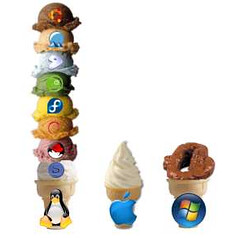This article on operating system technologies is written by Paul Barrett, a web developer for www.bathroomrenovationsperth.net, a business helping people find bathroom design in Perth and other bathroom related needs.
The opinion is author's own and may be different from blog owner's.
The opinion is author's own and may be different from blog owner's.
 |
| Image by KobraSoft |
So, in an afternoon I managed to install Redhat Linux and eagerly began to use my new operating system. I used KDE as my desktop environment which seemed pretty polished at the time, and then loaded on a series of applications with which to run my business. Eventually, it was the inability of OpenOffice to 100% work with Microsoft Office data that forced me back to Windows but for a while there I was a glorified fully fledged Linux user.
Current Market Share of Linux on the Desktop
Presently, according to research done by the main search engines, the main operating system in use by far is Windows (at over 90%). Linux has hovered at around 1% of desktops for a number of years now and this does not look set to change. There are some reasons for this.Why is the share so low?
What many of us may not know is how widespread Linux is in all the other areas of everyday life. A very large percentage of mobile devices run on Linux. GPS systems, DVD and Blu-Ray players, eBook Readers, and all manner of consumer electronics use Linux at their core. In these markets it is actually Windows that operates in the 1% share, and Linux in shares of around 90% for some things.Chances are, the hosting computer that you are reading this from is running Linux as its operating system.
The problem is not the technical viability of Linux. Nor is the problem the compatibility of applications any more – virtually all compatibility issues have been solved some time ago.
The problem is marketing. The problem is also the business model of Linux. Namely - that there is not one.
We have long been aware of technologies that have lost in the market, despite being better than their competitors, and Linux has fallen into this category for a long time.
The markets where Linux is successful are invisible to the consumer. It is not unreasonable to say that nearly everyone uses Linux, every day, without knowing. Linux has never received the credit for the work it has done.
So, like a loud and bossy sibling, Microsoft will continue to dominate the minds of the market and ability to access their purse strings.
Perhaps one day we will see some hope for Linux, but there is probably still no chance for this until we see some real marketing efforts. And the business model ensures that we never will.
0 comments:
Post a Comment